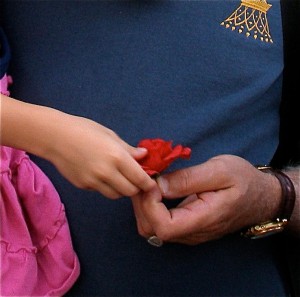Wednesday
Community ArticlesRadical Friendliness
Alicia Vogl Saenz is a museum educator at one of Los Angeles’ premiere art institutions. She shares a bit about how the Shambhala teachings inspired her to create a culture of “Radical Friendliness” at the musuem.A few years ago, my supervisor and I were planning a training for a group of young adults, mostly college students, who work as artist assistants in education programs for children and families at the museum where I work. As we talked, we made lists of the kinds of skills and duties we felt were necessary. We kept coming back to friendliness as the basis to create a positive environment. Jokingly, I said: What about radical friendliness? Let’s radically change the perception that museums don’t like kids. We both laughed, but the term stuck. Radical friendliness stayed with us because the term encapsulates our belief that if staff is welcoming and kind, we can change the perceptions that families have about museums.
We can counteract the notion that museums are steeped in elitism, academia, and privilege. We tell staff: Your smiling face and genuine helpful attitude can dispel those ideas.
What we realized as well, was that just telling staff to be “friendly” wasn’t going to work. We needed to create a culture of care. We became more aware of how we modeled kindness and caring. How we showed a welcoming attitude. It is clear that it all starts with the way staff treats each other. When they are kind, friendly and courteous to each other, then they are happy. That includes making sure that tasks are evenly divided – not just a few doing all the hard work, like washing brushes. A happy staff makes for a welcoming environment where families coming to the museum feel relaxed enough to look at, talk about, and make art. It has come to mean that we can create an environment where staff cares about each other, cares about the work we do, and cares about the kids and families that participate. I’m so lucky that I have a supervisor that is kind and open-hearted, that understands the power of friendliness.
Reader, you may be thinking – Seems like a great place to work, I wish my job in college had been like that, but why are you writing about this on the Shambhala Times? I firmly believe that radical friendliness comes out of the principles of basic goodness and maitri (loving-kindness). Before becoming a practitioner, I may have had the desire to create a culture of care at work, but I didn’t have the means.
The Sakyong, in his Shambhala Day address said: “We have inherited the principle of basic goodness, which can be a dynamic and socially transformative principle.” I often question myself about whether I am bringing the teachings into my everyday life, as I think many practitioners do. Especially, when I see petty, angry and jealous thoughts float in and out of my mind during meditation. But I think the real struggle is actually recognizing the profound changes the teachings have already made in my life, and that includes my work life. It happens slowly. It happens in the simple mundane-ness of being kind to each other.
~~
 Alicia Vogl Saenz has been a practitioner of Shambhala Buddhism since 2007. For the past 13 years, she has worked as a museum educator. In addition she has become a runner, her teacher, the Sakyong Mipham Rinpoche as inspiration.
Alicia Vogl Saenz has been a practitioner of Shambhala Buddhism since 2007. For the past 13 years, she has worked as a museum educator. In addition she has become a runner, her teacher, the Sakyong Mipham Rinpoche as inspiration.






Mar 15, 2013
Reply
Thank you for this!! This s the message “Culture and Decorum” is trying to share as well as all areas of Shambhala..